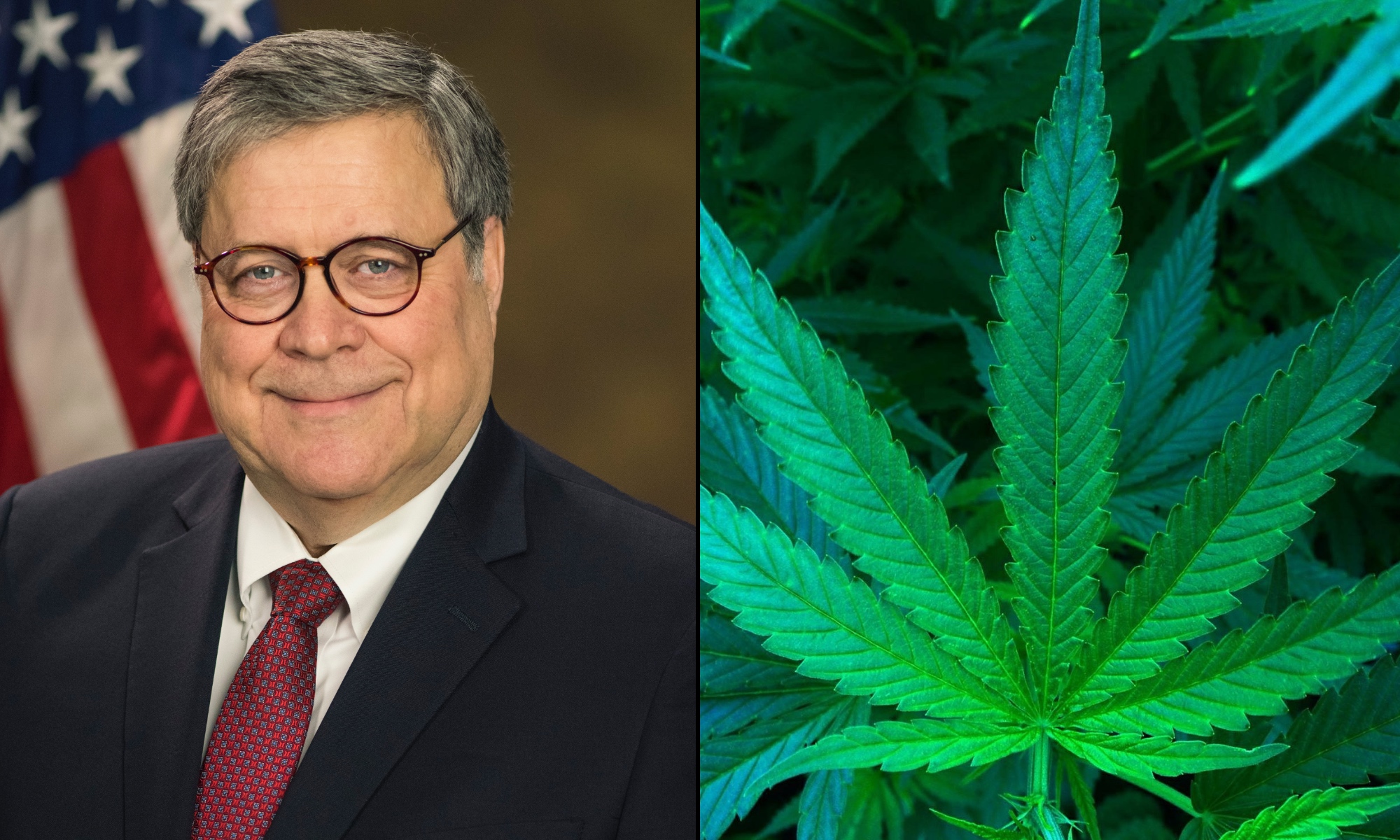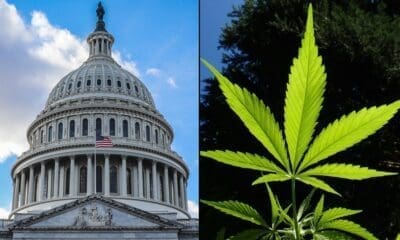Politics
Lawmakers Slam Attorney General Over Improper Marijuana Investigations Alleged By Whistleblower

Several members of a key congressional committee on Wednesday expressed concerns over a Justice Department whistleblower’s allegations that the attorney general directed multiple improper antitrust investigations into marijuana business mergers because of his personal opposition to the industry.
Reps. Steve Cohen (D-TN), Pramila Jayapal (D-WA) and Mary Gay Scanlon (D-PA) each directly questioned the witness, John Elias, about the allegations at a hearing that also covered other unrelated reports of inappropriate actions by Attorney General William Barr.
The lawmakers touched on the costs of the cannabis investigations to taxpayers, the waste of department resources to conduct the inquiries and the attorney general’s apparent animus toward businesses operating in accordance with state legalization laws.
“Did that cost the cannabis folks a lot of money?” Cohen asked.
“Absolutely, these subpoenas that get issued that require production of millions of documents is very burdensome,” Elias, who has been with the Justice Department for 14 years, said.
“So it was harassment by Bill Barr of an industry he didn’t like, is that right?” the congressman followed up.
The witness replied that “I think that’s a fair way to characterize it, yes.”
“Barr doesn’t like marijuana. Marijuana is seven times more likely to be enforced against young African Americans, breeding discontent with police and breeding interactions with police, and Barr doesn’t care about that type of stuff because he doesn’t like marijuana,” Cohen said. “That’s one of the breeding grounds of distrust of African Americans and police and police and African American contact and problems. Very unfortunate.”
Later in the hearing, Elias disclosed in response to a question from Scanlon that a second, unnamed Justice Department whistleblower had similarly raised concerns about the Antitrust Division’s marijuana investigations that were reportedly made at the attorney general’s behest. He further said that the response to his complaint was troubling because the Office of Professional Responsibility (OPR) determined that even if the investigations were directed out of personal animus, that would not represent a violation of any rule.
“That’s very concerning to me because it seems so self-evident that if your sole motivation is animosity that that’s impermissible,” he said.
Rep. Lou Correa (D-CA) wasn’t able to attend the House Judiciary Committee hearing, but his office shared a copy of his prepared statement on the subject with Marijuana Moment. He said it was unacceptable that the allegedly improper cannabis-related investigations accounted for nearly one-third of the Antitrust Division’s caseload in 2019.
“After nearly four years, I did not think the actions of this administration could continue to shock me,” he said. “John Elias’s testimony showed me just how wrong that was. The very idea that the lead law enforcement professional in the land would use the immense power of the United States government to investigate American businesses out of his own personal animosity should put fear into every American.”
“Due process and equal protection under the law are the cornerstones of our democracy,” he added. “When they crumble, the fabric of our democracy and legal system follows close behind.”
Correa noted the growing number of states that have legalized cannabis in some form and “yet the federal government repeatedly treats this legal industry as criminals and second-class businesses.”
“The attorney general’s blatant abuse of his authority to improperly investigate cannabis businesses shows just how important it is to end the federal prohibition of cannabis,” he said. “Regardless of Mr. Barr’s own personal feelings, Americans wildly support descheduling cannabis, and it is time ur federal laws represented the people’s will.”
“Attorney General Barr has once again shown he cannot be trusted to meet the high standards of his position. His use of the Department of Justice Antitrust Division to satisfy his own personal grudges are beyond reproach. If these allegations stand true, there must be serious consequences for the Attorney General. Every American must know with full confidence that the leader of American law enforcement will protect each of our constitutional right to due process and equal protection under the law. When investigations by the Department of Justice can be directed by the personal whims of individual men, the very core of our legal system shattered.”
Jayapal stressed that the allegations indicate the Justice Department’s resources and taxpayer dollars were wasted at the whim of the nation’s top prosecutors. She first asked how much of the division’s staff was involved in the investigations.
“Congresswoman, there were dozens of staff—attorneys, paralegals, economists and others who worked on these various cases,” Elias replied.
Jayapal also pressed the witness on the extent to which the millions of documents that were obtained over the course of the investigations were reviewed.
“I think a very small number of the documents were reviewed,” he said, adding that many were “uploaded after the closing process had been initiated as if they were irrelevant to the investigation.”
Ultimately, across 6 of the 10 investigations for which data are available, 5,965,000 documents were produced by the marijuana companies under inquiry.
“So they requested enormous resources, taxpayer dollars were used, these documents were never really looked at, they weren’t relevant to the investigations—and so to be clear, at Attorney General Barr’s direction, the department expends countless taxpayer resources to force companies to ultimately produce millions of pages of evidence and then doesn’t even look at or upload some of that evidence before admitting there’s a violation,” Jayapal said.
“Have you ever seen anything this extreme?” she asked.
“In my experience, which includes 14 years at the Justice Department at many different levels of the antitrust division, no, I have never seen anything like that,” the witness said.
Asked why the situation is concerning to him, Elias said it’s “concerning because the investigations and the work of the Antitrust Division need to be done in good faith—they need to be done evenhandedly—both for the sake of everybody involved and for the sake of the public’s perception of the rule of law in that the Justice Department is being aboveboard with everything.”
“For it to disregard the usual standards in the law on what counts for an antitrust investigation is improper and an abuse,” he said.
Early in the hearing, Rep. Doug Collins (R-GA) mentioned that the Justice Department’s OPR had determined that the investigations into cannabis mergers didn’t violate rules or regulations and questioned his political motivations. He also brought up marijuana’s legal status under federal law and asked the witness whether he knew what schedule the plant is classified as under the Controlled Substances Act.
Elias said he knew it was a controlled substance but wasn’t sure of the schedule.
“You were part of an antitrust in marijuana and didn’t know how it was scheduled?” Collins said. “The credibility of this is going downhill quickly here.”
Other committee members, including Rep. Greg Stanton (D-AZ), spoke more broadly about the Justice Department’s antitrust investigations without explicitly discussing the marijuana merger inquiries. He said the department’s “resources are not being used to protect the American people” when it is “pursuing meritless investigations.”
All of these questions come one day after Elias’s written testimony was first released, detailing how the attorney general directed questionable investigations into 10 mergers of state-legal marijuana companies, including one for MedMen and PharmaCann that seemed to have resulted in the end of the agreement.
“The head of the Antitrust Division, Assistant Attorney General Delrahim, responded to internal concerns about these investigations at an all-staff meeting on September 17, 2019,” the witness said. “There, he acknowledged that the investigations were motivated by the fact that the cannabis industry is unpopular ‘on the fifth floor,’ a reference to Attorney General Barr’s offices in the DOJ headquarters building.”
“Personal dislike of the industry is not a proper basis upon which to ground an antitrust investigation,” he said.
Barr’s personal opposition to the cannabis industry doesn’t seem to comport with statements he’s made in various congressional hearings, where he’s expressed interest in resolving the state-federal conflict over marijuana policy. Last year, he said that while he personally opposes legalization, he would prefer for Congress to pass a bill respecting the rights of states to implement their own cannabis policies rather than maintain blanket federal prohibition.
Federal Commission Pushes Expansion Of Marijuana And Psychedelics Research For Military Veterans
















